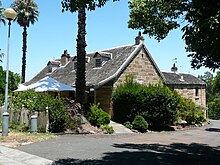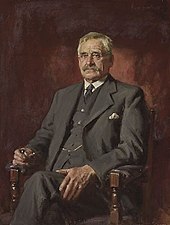| Revision as of 09:32, 25 March 2014 view sourceClueBot NG (talk | contribs)Bots, Pending changes reviewers, Rollbackers6,439,223 editsm Reverting possible vandalism by Jkljn to version by Figaro. False positive? Report it. Thanks, ClueBot NG. (1762166) (Bot)← Previous edit | Revision as of 09:43, 25 March 2014 view source Callanecc (talk | contribs)Edit filter managers, Checkusers, Oversighters, Administrators73,478 editsm Protected Banjo Paterson: Persistent vandalism: Long term history of vandalism, gave unprotection and pending changes a chance to work but it hasn't ( (indefinite) Next edit → |
| (No difference) | |
Revision as of 09:43, 25 March 2014
| Andrew Barton "Banjo" Paterson | |
|---|---|
 Banjo Paterson Banjo Paterson | |
| Born | (1864-02-17)17 February 1864 "Narrambla", near Orange, New South Wales, British Empire |
| Died | 5 February 1941(1941-02-05) (aged 76) Sydney, New South Wales, Australia |
| Occupation(s) | Author, Journalist, Composer, Clerk, Poet |
| Spouse | Alice Walker |

Andrew Barton "Banjo" Paterson OBE (17 February 1864 – 5 February 1941) was an Australian bush poet, journalist and author. He wrote many ballads and poems about Australian life, focusing particularly on the rural and outback areas, including the district around Binalong, New South Wales, where he spent much of his childhood. Paterson's more notable poems include "Waltzing Matilda", "The Man from Snowy River" and "Clancy of the Overflow".
Biography
Andrew Barton Paterson was born at the property "Narrambla", near Orange, New South Wales, the eldest son of Andrew Bogle Paterson, a Scottish immigrant from Lanarkshire, and Australian-born Rose Isabella Barton, related to the future first Prime Minister of Australia Edmund Barton. Paterson's family lived on the isolated Buckinbah Station near Yeoval NSW until he was five when his father lost his wool clip in a flood and was forced to sell up. When Paterson's uncle died, his family took over the uncle's farm in Illalong, near Yass, close to the main route between Melbourne and Sydney. Bullock teams, Cobb and Co coaches and drovers were familiar sights to him. He also saw horsemen from the Murrumbidgee River area and Snowy Mountains country take part in picnic races and polo matches, which led to his fondness of horses and inspired his writings.
Paterson's early education came from a governess, but when he was able to ride a pony, he was taught at the bush school at Binalong. In 1874 Paterson was sent to Sydney Grammar School, performing well both as a student and a sportsman. At this time, he lived in a cottage called Rockend, in the suburb of Gladesville. The cottage is now listed on the Register of the National Estate. Matriculating at 16, he took up the role of an articled clerk in a law firm and on 28 August 1886 Paterson was admitted as a qualified solicitor.
In 1885, Paterson began submitting and having his poetry published in the Sydney edition of The Bulletin under the pseudonym of "The Banjo", the name of a favourite horse. Paterson, like The Bulletin, was an ardent nationalist and, in 1889 published a pamphlet, Australia for the Australians, which told of his disdain for cheap labour and his admiration of hard work and the nationalist spirit. In 1890, as "The Banjo" he wrote "The Man from Snowy River", a poem which caught the heart of the nation and, in 1895, had a collection of his works published under that name. This book is the most sold collection of Australian bush poetry and is still being reprinted today. In his lifetime, Paterson was second only to Rudyard Kipling in popularity among living poets writing in English. Paterson also became a journalist, lawyer, jockey, soldier and a farmer.
Paterson became a war correspondent for The Sydney Morning Herald and The Age during the Second Boer War, sailing for South Africa in October 1899. His graphic accounts of the relief of Kimberley, surrender of Bloemfontein (the first correspondent to ride in) and the capture of Pretoria attracted the attention of the press in Britain. He also was a correspondent during the Boxer Rebellion, where he met George "Chinese" Morrison and later wrote about his meeting. He was editor of the Sydney Evening News (1904–06) and of the Town and Country Journal (1907–08).
In 1908 after a trip to the United Kingdom he decided to abandon journalism and writing and moved with his family to a 40,000-acre (160 km) property near Yass.
In World War I, Paterson failed to become a correspondent covering the fighting in Flanders, but did become an ambulance driver with the Australian Voluntary Hospital, Wimereux, France. He returned to Australia early in 1915 and, as an honorary vet, travelled on three voyages with horses to Africa, China and Egypt. He was commissioned in the 2nd Remount Unit, Australian Imperial Force on 18 October 1915, serving initially in France where he was wounded and reported missing in July 1916 and latterly as commanding officer of the unit based in Cairo, Egypt. He was repatriated to Australia and discharged from the army having risen to the rank of major in April 1919. His wife had joined the Red Cross and worked in an ambulance unit near her husband.
Just as he returned to Australia, the third collection of his poetry, Saltbush Bill JP, was published and he continued to publish verse, short stories and essays while continuing to write for the weekly Truth. Paterson also wrote on rugby league football in the 1920s for the Sydney Sportsman.
Paterson died of a heart attack in Sydney on 5 February 1941 aged 76. Paterson's grave, along with that of his wife, is in the Northern Suburbs Memorial Gardens and Crematorium, Sydney.
Personal life
On 8 April 1903 he married Alice Emily Walker, of Tenterfield Station, in St Stephen's Presbyterian Church, in Tenterfield, New South Wales. Their first home was in Queen Street, Woollahra. The Patersons had two children, Grace (born in 1904) and Hugh (born in 1906).
Works


One of his most famous poems is "Waltzing Matilda", which was set to music and became one of Australia's most famous songs. Others include "The Man from Snowy River", which inspired a movie in 1982 and inspired a TV series in the 1990s, and "Clancy of the Overflow", the tale of a Queensland drover.
In 1905 he published a collection of bush ballads entitled Old Bush Songs.
Paterson's poems mostly presented a highly romantic view of rural Australia. Paterson himself, like the majority of Australians, was city-based and was a practising lawyer. His work is often compared to the prose of Henry Lawson, a contemporary of Paterson's, including his work "The Drover's Wife", which presented a considerably less romantic view of the harshness of rural existence of the late 19th century.
Paterson authored two novels; An Outback Marriage (1906) and The Shearer's Colt (1936), wrote many short stories; Three Elephant Power and Other Stories (1917), and wrote a book based on his experiences as a war reporter; Happy Dispatches (1934). He also wrote a book for children The Animals Noah Forgot (1933)
Contemporary recordings of many of Paterson's well known poems have been released by Jack Thompson, who played Clancy in the film adaptation of The Man from Snowy River.
Media reports in August 2008 stated that a previously unknown poem had been found in a war diary written during the Boer War.
Legacy
Banjo Paterson's image appears on the $10 note, along with an illustration inspired by "The Man From Snowy River" and, as part of the copy-protection microprint, the text of the poem itself.
In 1981 he was honoured on a postage stamp issued by Australia Post.
A. B. Paterson College, at Arundel on the Gold Coast, Australia, is named after Paterson.
The A. B. "Banjo" Paterson Library at Sydney Grammar School was named after Paterson.
The Festival of Arts in Orange, New South Wales, presents a biennial Banjo Paterson Award for poetry and one-act plays and there is also an annual National Book Council Banjo Award.
Selected works
- Clancy of the Overflow (1889)
- The Man from Snowy River (1890)
- In Defence of the Bush (1892)
- The Man from Ironbark (1892)
- Waltzing Matilda (1895)
- Hay and Hell and Booligal (1896)
- Mulga Bill's Bicycle (1896)
- T.Y.S.O.N. (1898)
- We're All Australians Now (1915)
- A Bush Lawyer (1933)
References
- The Verse of A.B. (Banjo) Paterson Australian Bush Poetry, Verse & Music; Accessed on 6 June 2007
- "Australian Honours". It's An Honour. Australian Government. Retrieved 2010-04-25. Services to literature (1939)
- ^ Clement Semmler (1988). "Paterson, Andrew Barton (Banjo) (1864 - 1941)". Australian Dictionary of Biography, Volume 11. MUP. pp. 154–157. Archived from the original on 16 March 2008. Retrieved 2008-04-03.
{{cite web}}: Unknown parameter|deadurl=ignored (|url-status=suggested) (help) - Percival Serle (1949). "Paterson, Andrew Barton (1864-1941)". Dictionary of Australian Biography. Angus & Robertson. Retrieved 2008-01-19.
- Yeoval Community Website
- ^ "Bard of the Bush". The Daily Mirror. Truth and Sportsman Ltd. 1956-06-20. p. 21.
{{cite news}}:|access-date=requires|url=(help); Cite has empty unknown parameter:|coauthors=(help) - Reserve Bank
- Australian Writers, L. J. Blake, Rigby Limited, 1968
- "Paterson, Andrew Barton Service Records Item no 4028776". National Archives of Australia. Retrieved 2010-04-25.
- Headon, David (October 1999). "Up From the Ashes: The Phoenix of a Rugby League Literature" (PDF). Football Studies Volume 2, Issue 2. Football Studies Group. Retrieved 2009-07-07.
{{cite web}}: Cite has empty unknown parameter:|coauthors=(help) - Banjo Paterson-His Life, Tenterfield Tourism
- finepoets.com
- Campion, Vikki (18 August 2008). "Poet's works discovered in war diary". The Courier-Mail.
- "Australia Post website". Retrieved 2012-09-08.
- Notes on Author: Andrew Barton Paterson
- Australian Authors - A. B. ("Banjo") Paterson (1864-1941)
- "Banjo" Paterson
External links
- AB 'Banjo' Paterson Biographical Summary - Reserve Bank of Australia website
- Family Tree
- Photos of Banjo Paterson memorial outside Orange NSW
- Works by Banjo Paterson at Project Gutenberg
- Works by A B Paterson at Project Gutenberg Australia
- "The Man from Snowy River and Other Verses" on Freeread.co.au
- National Geographic Society magazine August 2004 article on "Banjo" Paterson
- Banjo Paterson Biography at www.wallisandmatilda.com.au
- Paterson, Andrew Barton (Banjo) (1864-1941) The National Library of Australia's Federation Gateway (Retrieved 5 August 2007)
- Listen to the first recording of the song Waltzing Matilda on australianscreen online
- 'Waltzing Matilda' was added to the National Film and Sound Archive's Sounds of Australia registry in 2008.
| Banjo Paterson's "The Man from Snowy River" | |
|---|---|
| Films | |
| Stage musical | |
| Television | |
| Works by Banjo Paterson | |
|---|---|
| Poems |
|
| Short stories |
|
| Collections | |
- 1864 births
- 1941 deaths
- Australian journalists
- Australian rugby league journalists
- Australian poets
- People from Sydney
- Writers from New South Wales
- Australian people of Scottish descent
- People of the Second Boer War
- War correspondents
- Australian Thoroughbred Racing Hall of Fame inductees
- Officers of the Order of the British Empire
- People educated at Sydney Grammar School
- 19th-century Australian writers
- 20th-century Australian writers
- 19th-century poets
- 20th-century poets